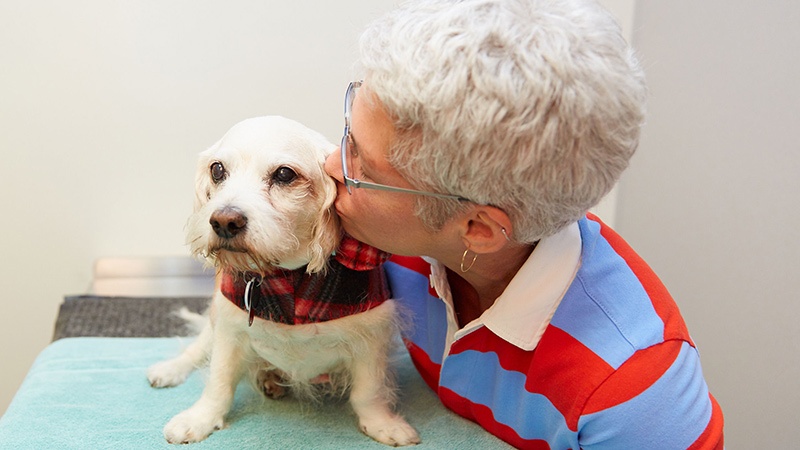
What is Canine Influenza?
Canine influenza, aka ‘dog flu’, is a respiratory disease that is easily spread among dogs. While not usually fatal, the most recent strain (H3N2) that was on the rampage last year, was a highly contagious one, affecting nearly 80% of dogs that were exposed. Canine influenza, in general, is spread by aerosolized respiratory secretions (via coughing, barking, and sneezing). It can also be spread by contaminated objects such as kennel surfaces, food and water bowls, collars and leashes. Additionally, people who move between infected and uninfected dogs can be a source of canine influenza. The virus can remain infective for up to 48 hours on surfaces, 24 hours on clothing, and 12 hours on hands.
The incubation period is usually two to four days from the time of exposure. Dogs are most contagious during this incubation period when they are not exhibiting signs of illness. Contagiousness decreases dramatically during the first four days of symptoms but can last up to seven days.
There is no evidence that the canine influenza virus will infect humans, horses, ferrets, or other species. However, rarely, the dog flu can be contracted by felines.
So far this year, Asheville has seen no confirmed cases of canine influenza in 2017. But, just to be aware and on the lookout:
Signs and Symptoms of Canine Influenza
- Runny nose and sneezing
- Decreased appetite
- Malaise
- Coughing
- Fever
- Difficulty breathing
Dogs that are infected with the canine influenza virus may take one of two paths:
- Mild – A cough that is typically moist and can have nasal discharge. Occasionally, it will be more of a dry cough. In most cases, the symptoms will last 10 to 30 days and usually will go away on their own.
- Severe – A high fever (above 104 degrees Fahrenheit) and fast onset of symptoms. Pneumonia, specifically hemorrhagic pneumonia, can develop. The virus can affect the capillaries in the lungs, so the dog may cough up blood and have trouble breathing. They can also be susceptible to bacterial pneumonia, which can complicate the situation.
If you are worried that Fido has the dog flu, you may want to take her to your vet. They will perform a physical exam and run blood work including serum chemistries and a complete blood cell count, looking for elevated levels of white blood cells fighting infection. Sometimes, if she is having difficulty breathing, radiographs or x-rays may be taken to see if pneumonia is present. Laboratory tests are available to detect the virus, however since the virus itself is present for only 3-7 days and the turnaround time for these tests are several days, they are not often run.
Treatment for Canine Influenza
When you think about it, we handle canine influenza about the same way we handle human influenza. Makes sense, right? Since it’s a virus, antibiotics are of no use unless your four-legged friend has a prolonged or extremely difficult time clearing the illness, which may mean that there is a secondary bacterial infection involved. At Sunvet Animal Wellness Clinic, the more common, milder form of dog flu is treated with homeopathic cough syrup and our Influenza homeopathic. Those dogs with the mild form of the infection usually recover on their own. It’s important to create a relaxing, stress-free environment as much as you can while you are isolating the patient from other dogs. Because these infected dogs can be contagious for a while, some experts recommend isolating them for up to 21 days.
In severe cases,, just as with flu-infected people, they may need to be treated aggressively with a broad spectrum of antibiotics, due to possible secondary bacterial infections, intravenous fluids, and other general support regimens. Of course, this would require hospitalization and isolation until he or she is stable.
Tricks to Help Prevent Dog Flu
- Practice good sanitation. Use a bleach and water mixture (one part bleach to 30 parts water) to disinfect common areas such as tables, bowls, leashes, crates, etc. Allow items to thoroughly air dry for a minimum of 10 minutes before exposing dogs to them.
- Any dog that is suspected of having canine influenza should be isolated from other dogs.
- Some folks may want to vaccinate their canines against the flu. If vaccination is chosen, it is important to note that no vaccine is without risk and a course of two vaccines are needed for protection. You must start this series of vaccines five weeks before the dog is expected at the kennel, daycare, boarding etc. The second vaccine is given three weeks after the first vaccine. I then recommend waiting two more weeks after this second vaccine before exposing them to the kennel, etc. The vaccines are $40-45 each.
- There is no vaccine for felines. If a dog in the same household should come down with the dog flu, separate any family felines from this dog.
- I also want to add that soap and UV rays from sunlight will also cause the flu virus to be damaged and, therefore, not be able to infect a new host dog.
- Sunvet Animal Wellness Clinic has an Influenza Homeopathic available. Each dog is dosed once daily during the flu season. The beauty of homeopathic is that there are no side effects. This homeopathic will help most dogs avoid infection, and the ones that contract the flu should have a milder form of the disease. You can purchase the product in our clinic.
- For those of you who are able, think about creating a closed group of doggie friends that only play with each other and avoid areas of increased dog traffic, especially during the summertime when dog flu is in full season.
If another epidemic hits, use this article for your reference. Don’t let it get you down and cramp your style. Gather all your influenza information, then sit down and make a plan of attack. Take a deep breath, be practical and create the outcome you desire. Whatever you do, consider the wonders of vibrational medicine and include the Influenza homeopathic in your anti-flu regimen. You’ll be glad you did!

